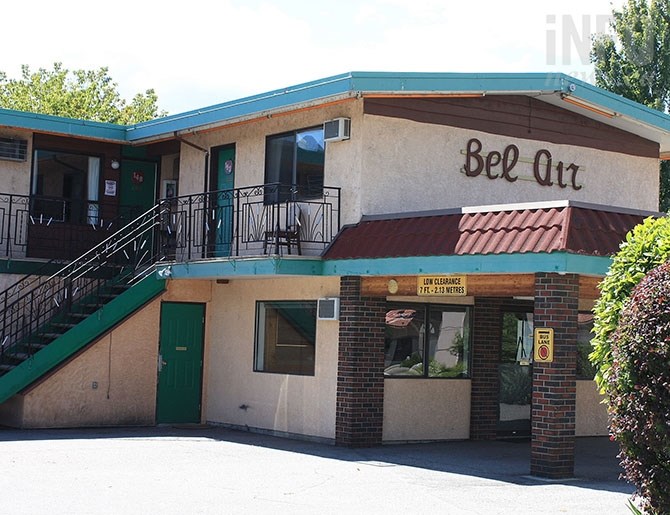
Penticton municipal candidates discuss affordable housing in the city.
(STEVE ARSTAD / iNFOnews.ca)
October 17, 2018 - 9:19 PM
PENTICTON - A major issue in the City of Penticton leading into this year’s municipal elections has been the lack of affordable housing.
Recent initiatives by B.C. Housing and the province are providing new units, in response to a province wide crisis, but most residents see housing as an ongoing issue in the Peach City, where average wages simply aren’t adequate enough to pay the average rent.
We asked Penticton’s mayoral and councillor candidates: What can the City of Penticton do to make housing more affordable for residents?
The answers run a spectrum from home building programs, to allowing various forms of density housing, to developer initiatives, cutting city hall red tape and demands for more assistance from higher levels of government.
Below are excerpts from larger answers. Full answers to the questions as received are at the bottom of the page.
Andrew Jakubeit (for mayor): We are in the third year of record development and over 1,668 housing units have come onto the market since 2014.
The city allows for carriage houses and secondary suites to offer housing alternatives and mortgage helpers.
Dominic Wheeler (for mayor): We, as a city can embrace those considering alternative building methods for new developments. Examples could include modular, brick-wood, recycled plastic brick or even concrete printed homes.
John Vassilaki (for mayor): We can also explore developer incentives to ensure that every new build includes a per centage of affordable housing, whether that is an apartment building or a new subdivision.
Jason Cox (for mayor): The city can be doing more to grow the local economy. The city can also help small business be successful when it sees itself as a problem solver and not as a regulator.
Jukka Laurio (for mayor): Cities can do nothing to create affordable housing. For first time buyers, a government program similar to the building of the basic, four room houses, at low prices after the second World War.
James Blake (for mayor): If we could extend (mortgage) loans, to say 50 years the banks, long term, would actually make more money and the monthly payment on a home would be cut in half, making it possible for many more people to get into a home.

Penticton Mayoralty candidate James Blake.
Image Credit: SUBMITTED
Connie Sahlmark: We need to address the missing middle of housing which includes not just carriage houses but also cluster neighbourhoods, zoning for tiny houses and micro-suites.
Marie Prior: We are not a Vancouver or Kelowna, we need to remember even though we have a lack of housing, we should not force large apartment buildings over four stories down the throats of our community, as happened on Kinney Avenue.
Kevin Proteau: Cut the red tape at city hall to keep costs of running city hall contstrained. By constraining city hall it will help keep costs down and keep money in residents’ pockets.
Frank Regehr: The number of vacation rentals should be managed; appropriated license fees applied and a portion of those fees could go to an affordable housing fund.
Max Picton: We can look at adapting the Economic Investment Zone program to help create more affordable housing options by incentivizing developers to invest more heavily into this type of housing stock.
Julius Bloomfield: The city needs to require developers to show that the developments they are proposing are beneficial to the city.
Katie Robinson: The city does own land that should be considered for development.
Doug Maxwell: Affordable housing is coming, just very slowly and late. Proactive would have better than reactive by all levels of government.
Glenn Clark: The market is out of control and has handcuffed many. The best solution is bringing stable, better paying jobs to our community.
Jake Kimberley: It is not the city’s responsibility to subsidize affordable housing, that is the responsibility of the provincial government.
Campbell Watt: The key is to create value while reducing costs, which is obviously very difficult to do. You can use city lands with the right partner to ensure lower development costs.
Daryl Clarke: What we really need is a better year round economy and better paying jobs that don't leave when the tourists leave.
These candidates did not provide us with any of their thoughts on this issue:
John Archer
Duffy Baker
Karen Brownlee
Christopher Evison
Joe Frocklage
Isaac Gilbert
Lynn Kelsey
Jesse Martin
David O’Brien
Christopher Millin
Darryl Sanders
Judy Sentes
Here are the candidates’ comments in their entirety:
Jukka Laurio: Cities can do next to nothing to create affordable housing.
Two ways to create affordable housing: 1. Increase supply until there is an large excess of housing; supply and demand economics will take care of it from there. 2. A multi level government program to build a large numbers of small scale, limited life span, low cost, no frills, basic, small rental units to be rented out on a cost plus basis. For first time home buyers, a government program similar to the building of the basic four room houses,at low prices after World War II.
Andrew Jakubeit: We are in the third year of record development and over 1668 housing units have come onto the market since 2014. Creating more supply will reduce the demand and units that were older will have to be priced lower to compete with the new product offerings. We continue to partner with BC Housing to provide housing not just for homeless but also for people with low household incomes. B.C. Housing currently spends over $17 million annually locally for housing supplements.
The city allows for carriage houses and secondary suites to offer housing alternatives and mortgage helpers. What is missing in the federal governments housing strategy is some sort of incentive for purpose built long term rental units as many units are being used for short term (vacation) rentals which makes housing availability difficult.
The city facilitated a housing forum in spring to bring together non-profits and faith based groups with the development community in order to create some potential partnerships or programs. What if not-for-profit organizations partnered with local residents to build a carriage house or secondary suites? These groups can also act as rental agencies. Many people have large lots but don't have the financial capacity or knowledge to build and manage infill housing. Many non-profit housing initiatives can take up to five years to complete, so if we can create infill housing sooner more people would benefit.
James Blake: We must work with the financial institutions to allow home loans to be longer than 25 years. If we could extend the loans, to say 50 years the banks, long term, would actually make more money and the monthly payment on a home would be cut in half making it possible for many more people to get into a home.
Dominic Wheeler: There are many factors at play when considering the affordability of housing. One large factor is the availability of employment that offers a living wage. Small businesses in Penticton should not be charged utility rates and taxes higher than those of large corporations which rarely provide enough income for someone working full time to cover the costs of living. Instead, we should be offering lower rates that will offset the costs of these small businesses providing full time hours to their employees.
Availability of housing in Penticton is at a minimum. Densification is already being proposed in the OCP to address the incredibly low rental availability and the room for competition afforded to the rental market would have a positive impact on the affordability of quality rental options.
Penticton's high property values can be discouraging to those looking to first enter the housing market. We, as a city, can embrace those considering alternative building methods for new developments. Examples could include modular, brick-wood, recycled plastic brick or even concrete printed homes.
Jason Cox: Too many people are finding the cost of living to be a challenge. Too many seniors on fixed incomes are having to choose between food and power bills. Too many people are having to sacrifice opportunities with their children just to keep a roof over their heads.
First and foremost, affordable housing is a spectrum. The issue is not only about people being able to find a place to rent, it is also about the rising price of real estate and the challenge many people face to get into home ownership.
The surest way that we can help reduce the cost of both homes and rentals is by influencing supply and demand. We need to understand that densification and infill is appropriate in some areas, carriage homes and suites are important in others.
We need to help people afford a residence. We also need to help them afford their bills. The city owns its own utility and that is an asset. We need to address the number and amount of fees, charges and rates being piled on. We need to be transparent about rates and taxes and ensure that we charge residents and non-residents appropriately.
Of course, affordability is best countered with opportunity. The city can be doing more to grow the local economy. Good work has recently been done by the Economic Development Committee. I was a part of this committee for many years and know that we can take the data recently compiled from an extensive business survey to help local businesses find new markets and collaborate to attract and retain skilled labour. The city can also help small business be successful when it sees itself as a problem solver and not as a regulator. Many business owners have told me their struggles in getting new enterprises off the ground and the roadblocks they have encountered at the city. When local government can assist or even just get out of the way of entrepreneurs the result is a stronger local economy and more jobs to help people afford to live here.
John Vassilaki: The City of Penticton needs to continue to work closely with B.C. Housing, leveraging all the research done for our new Official Community Plan in determining what and where to invest for creating optimal housing solutions. We can also explore developer incentives to insure that every new build includes a percentage of affordable housing, whether that is an apartment building or a new subdivision.
Connie Sahlmark: There are multiple tools available to the city to address housing. As mentioned above, we need to address the missing middle of housing which includes not just carriage houses but also cluster neighbourhoods, zoning for tiny houses and micro-suites. Co-housing models can house 20 families on roughly the same infrastructure as a single-family dwelling. Though we are land locked there is no reason we cannot build housing on top of malls, office buildings or parking structures.
Another way to bring down housing costs is through retrofitting existing homes lowering residents’ utility costs.
An indirect method is to upgrade active transit methods within the city. Dedicated trails/paths for safe walking/cycling, increasing bus service allows residents to pair down to one or even zero vehicles. Not only do residents save the cost of fuel and insurance, it can ease the city’s parking congestion. Further to that end a “Car to go” or “Bike to go” program can be implemented as in Vancouver and Kelowna.
Marie Prior: Make concerted efforts to connect with associations, already in the low cost housing arena (habitat for humanity etc.) explore Sea.span (shipping) containers, refit and use for minimum emergency occupancy., Identify all freehold lands owned by the city, for possible re-builds into smaller units suitable for single persons. Carriage homes would double our single-family home space and affordable inventory while not putting excessive stress on our city infrastructure. We are not a Vancouver or Kelowna, we need to remember even though we have a lack of housing, we should not force large apartment buildings over four stories down the throats of our community, as happened on Kinney Avenue.
Daryl Clarke: We can lobby the various levels of government for more affordable housing we can allow carriage homes and we can change density zoning it will help. What we really need is a better year round economy and better paying jobs that don’t leave when the tourist leave, far to many young people have to work two and three jobs just to try and get enough to make rent each month and this needs to change. We need more jobs like those in the industrial area that pay enough to feed a family pay a mortgage and support our growing city.
Kevin Proteau: Cut the red tape at city hall to keep costs of running city hall constrained.
By constraining city hall it will help keep costs down and keep money in the residents pockets. Work with the provinces and federal governments because it' not just a local problem it's Canada wide. Mr. Cox mentioned the Medicine Hat model to address homelessness at the mayor's forum last night. I'm not to fluent on it but I am looking into it as well now. Maybe it's time to bring new people that are willing explore new directions. Housing first.
Frank Regehr: Secondary suites were approved to provide long-term rental accommodation for Pentictonites. Many are now used as nightly vacation rentals, leaving fewer units for citizens. The number of vacation rentals should be managed; appropriate license fees applied and a portion of those fees could go to an affordable housing fund.
Max Picton: The city can continue to work with the provincial government to help fund subsidized housing opportunities as they become available. In addition to this, we can also look at adapting the EIZ (Economic Incentive Zones) program to help create more affordable housing options by incentivising developers to invest more heavily into this type of housing stock.
Julius Bloomfield: The city needs to look at solutions such as creating zoning areas that allow rental buildings only. They also need to work with the development community to ensure that there is a reasonable mix of new housing. They also need to require developers to show that the developments they are proposing are beneficial to the city.
Doug Maxwell: Affordable housing is coming, just very slowly and late. Proactive would have been better than reactive by all levels of government.
Katie Robinson: Continue to work with B.C. Housing and other levels of Government to build more units. The City does own land that should be considered for development (as it did for Habitat for Humanity). There are never any easy answers, however collaboration and commitment to this critical issue must be addressed immediately.
Campbell Watt:The city would have to look at different types of incentives and look to partners like CMHC or BC Housing to really create “affordable” housing. The key is to create value while reducing costs which is obviously very difficult to do. You can use city lands with the right partner to ensure lower development costs. You can also try to incorporate some of the indirect costs of housing to keep the overall costs to the citizen lower by being conscious of properties near amenities to avoid the added cost of transit and try to incorporate as many energy efficiencies as possible.

Incumbent City Councillor Campbell Watt.
Image Credit: SUBMITTED
Glenn Clark: Lower taxes would help. Not having to pay for parking outside your home would help. The market is out of control and has handcuffed many. The best solution is bringing stable, better paying jobs to our community.
To do this we need to create amenities other than more hockey arenas. After losing the theatre ten years ago it is time to take a firm look at moving the performing arts centre forward, not more arenas.
A better balance between culture and sports will go a long way to attract the changes the city really wants; more doctors, more industry, better paying jobs.
Jake Kimberley: It is not the city’s responsibility to subsidize affordable housing that is the responsibility of the provincial government. If cities start doing that the province will hand it over to us.
To contact a reporter for this story, email Steve Arstad or call 250-488-3065 or email the editor. You can also submit photos, videos or news tips to the newsroom and be entered to win a monthly prize draw.
We welcome your comments and opinions on our stories but play nice. We won't censor or delete comments unless they contain off-topic statements or links, unnecessary vulgarity, false facts, spam or obviously fake profiles. If you have any concerns about what you see in comments, email the editor in the link above.
News from © iNFOnews, 2018